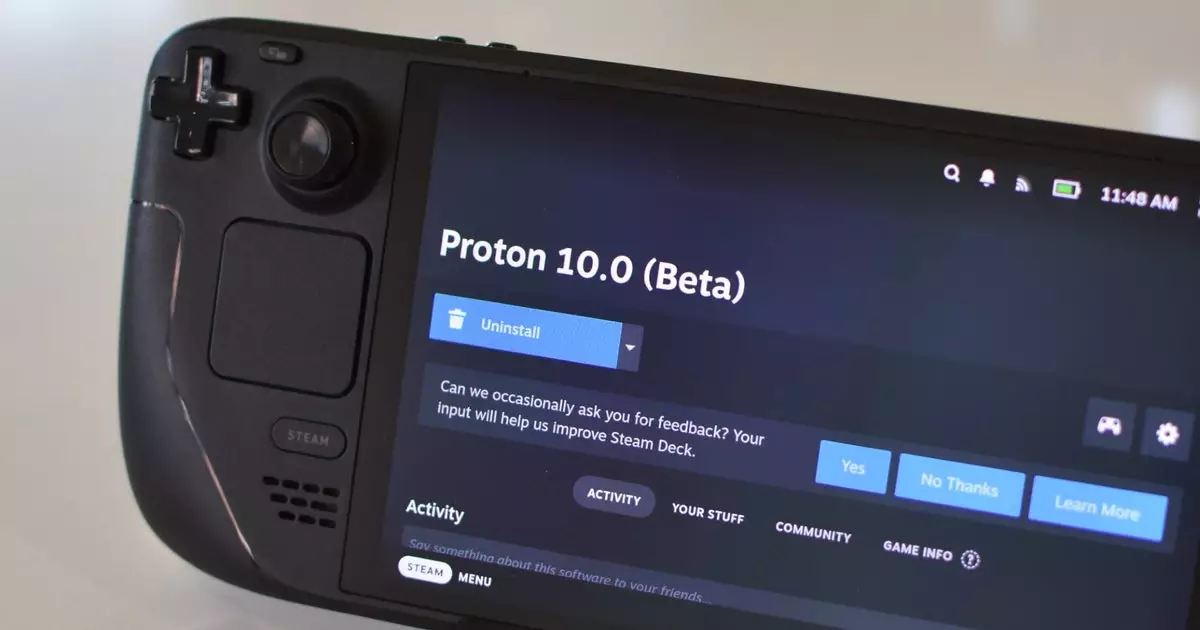The gaming landscape has undergone significant changes over the past few years, particularly for Linux users. Traditionally marginalized by a lack of compatible titles, gamers who favor open-source operating systems have seen a resurgence of interest thanks to the combined efforts of developers like Valve and CodeWeavers. The latest milestone in this evolution is the release of Proton 10.0, which represents a bold leap forward in making Windows games accessible on Linux platforms, particularly the Steam Deck. This update redefines our expectations for gaming compatibility and performance.
Major Compatibility Breakthroughs
Proton 10.0 is not just another routine update; it’s a comprehensive overhaul that opens the door for a plethora of previously incompatible titles. Gamers can now dip into celebrated franchises such as *Assassin’s Creed* and the expansive worlds of *Grand Theft Auto V* and *XCOM 2*. Games that previously bore the dreaded “Unsupported” label, such as *Microsoft Flight Simulator 2024* and *Batman: Arkham Asylum Game of the Year Edition*, are now within reach. These changes have the potential to transform how Linux gamers interact with their libraries and the broader gaming community—a concept that was once deemed a pipedream.
The significance of this release is magnified by the imminent possibility of re-evaluating many titles on Steam that have been unfairly judged as incompatible or virtually unplayable. Having firsthand experience with *Arkham Asylum*, I found that it finally performed seamlessly. Such performance not only enhances the user experience but also affirms the commitment of Valve and CodeWeavers to the Linux platform.
Attention to Diverse User Bases
Proton 10.0 is crafted with a diverse gaming community in mind, not just limited to users of the Steam Deck. Linux desktop users can also revel in this update’s fixes, especially those addressing the persistent crashes faced by *Stalker 2* and *Marvel Rivals*. Recognizing the need for a comprehensive fix that extends beyond handheld devices illustrates an impressive understanding of the varied environments in which gamers operate.
Moreover, the previous controversy surrounding *Marvel Rivals*, when the game was erroneously marked as a cheating tool, points to an essential learning curve in the ongoing development of Proton. Continuous refinements in compatibility, combined with community feedback, signal a culture of responsiveness that is quintessential to any thriving software ecosystem.
Streamlined Access and User Experience
What sets Proton 10.0 apart from its predecessors is its ease of accessibility. The beta is available for users without the need for fiddling with Device Manager configurations or diving into Desktop Mode—elements that once made testing different versions cumbersome for the average user. Installation is straightforward: a simple search within your Steam library leads you straight to Proton 10.0, allowing users to invoke the update as if launching any ordinary game.
This ease of use lowers the barrier for entry, inviting more gamers into the fold who may have shied away due to complexity or hesitation towards technical adjustments. The transparency with which Valve releases these beta versions allows those encountering compatibility issues a viable pathway to resolve them swiftly.
The Future of Gaming on the Linux Platform
In the broader context of gaming, Proton 10.0 is an essential building block for the future. The ongoing development signals a devoted effort to broaden the audience for Linux gamers while simultaneously challenging the status quo dictated by Windows-centric gaming. As more titles become compatible, the perception of Linux as a viable gaming platform will likely shift, and more developers may take notice and prioritize their projects for a wider audience.
Community-driven advancements such as Proton GE have set a precedent, and while they continue to contribute to enhancements, the official Proton updates deliver stability and reliability that the more adventurous bespoke builds sometimes lack. Thus, while unofficial adaptations remain relevant, the formal updates from Valve and CodeWeavers will likely establish a gold standard.
As we celebrate the launch of Proton 10.0, the gaming community must remember: these are not just updates, but rather transformative changes that have the potential to redefine how we interact with our digital worlds on Linux-based systems. This latest version has undeniably set a new precedent, heralding an exciting future for gamers everywhere and solidifying Linux’s position in the ever-evolving landscape of gaming technology.

